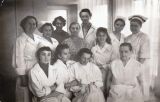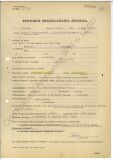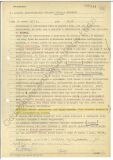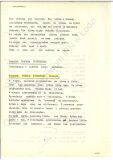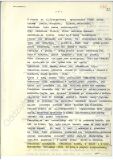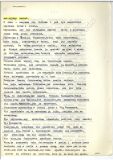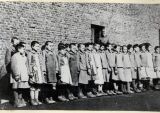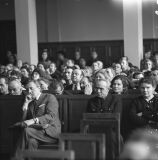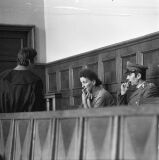back...Eugenia Pol – two faces of a guard at a German concentration camp at Przemysłowa street in Łódź
“I find it hard to understand how Eugenia Pol could hide two, so drastically different faces. Working at a day care facility, she was an unflawed and kind person. She was so caring towards children (…). This is beyond my comprehension that, a few years back, Eugenia Pol was capable of doing so terrible and cruel things to kids as a guard at a concentration camp for Polish children,”said Marianna Tomasik, who had worked at the same nursery as Eugenia Pol, in her conversation with a historian.
Eugenia Pol – a guard at the German concentration camp for Polish children at Przemysłowa street – worked for several years at a day care facility in Łódź as a food supply manager after the war ended. Executives at the state-owned working establishment did not verify her past. During the infamous lawsuit against the former guard in the 1970s, some of the witnesses who had survived the nightmare of concentration camp as children, testified that they had been terrified of Eugenia Pol.
“Each of us who worked in the kitchen at the time had to lie down and a selected girl had to beat us while Eugenia Pol was looking. Pol stood beside the girl and made sure she beat hard enough, counting every hit. Pol was always content when she punished someone. She ordered lashes with a smile on her face,” explains Jadwiga Starosta, a former prisoner in the concentration camp at Przemysłowa street.
“In 1942 I was brought to the camp in Łódź. The accused Eugenia Pol, who beat us, was there (…). If you did not complete the work, you were beaten. The accused beat us with a whip. The accused beat strongly, she did not pretend to beat us (…). The accused ordered us to do frog squats, during the day and at night. We had to extend our hands upwards in a squatting position, we had to jump,” recalled Teresa Stefaniak.
In January 1945, right before the Soviet army marched in, Eugenia Pol fled the camp with the rest of the staff. She stayed in Łódź, though. After the war, she lived at her old address. In spite of the fact that she signed the Deutsche Volksliste (German People’s List), the District Court in Łódź cleared her of the charge of “renouncing Polish nationality” in 1949.
Eugenia Pol found a job in the office of the Metal Processing Plant No. 10. In the “Łodzianka” sporting club, she developed her sports skills.
In November 1956 – thanks to a recommendation from a friend she had met at extramural administrative and trade courses – she was employed as a food supply manager at the People’s Army Cotton Processing Plant’s day care facility in Łódź.
“During her employment at our establishment, she has proved to be a good worker. She fulfils her job duties without fault. She is a disciplined, conscientious and friendly employee. She enjoys good reputation among her superiors and colleagues alike,” as the management’s opinion reads.
This positive opinion about Eugenia Pol was confirmed by witnesses from her work, who testified that she was nice, hard-working and kind to everyone, especially children.
“Eugenia Pol was an embodiment of kindness and integrity. As a food supply manager, she would never have dared to take any products intended for children (…). I find it hard to understand how Eugenia Pol could hide two, so drastically different faces. Working at the day care facility, she was an unflawed and kind person. She was so caring towards children,” reminisced Marianna Tomasik, who worked at the same nursery as Eugenia Pol after the war.
A former guard at the concentration camp at Przemysłowa street, Eugenia Pol argued that the day care facility management were aware of her past. The witnesses denied that, saying that she had never spoken about her past. She only said that, during the war, she “had worked with children.”
“This is beyond my comprehension that, a few years back, Eugenia Pol was capable of doing so terrible and cruel things to kids as a guard at a concentration camp for Polish children,”said Marianna Tomasik.
On 11 December 1970, Eugenia Pol was detained and temporarily arrested by the decision of the Provincial Prosecutor’s Office in Łódź. She was accused of killing six children. The court acknowledged the evidence of only complicity in two cases. The tormentor was sentenced to 25 years imprisonment.
Eugenia Pol was released after 19 years under the amnesty of 1989. She returned to Łódź, where she was under the supervision of the probation service for three years. She died as a free woman in 2003.

